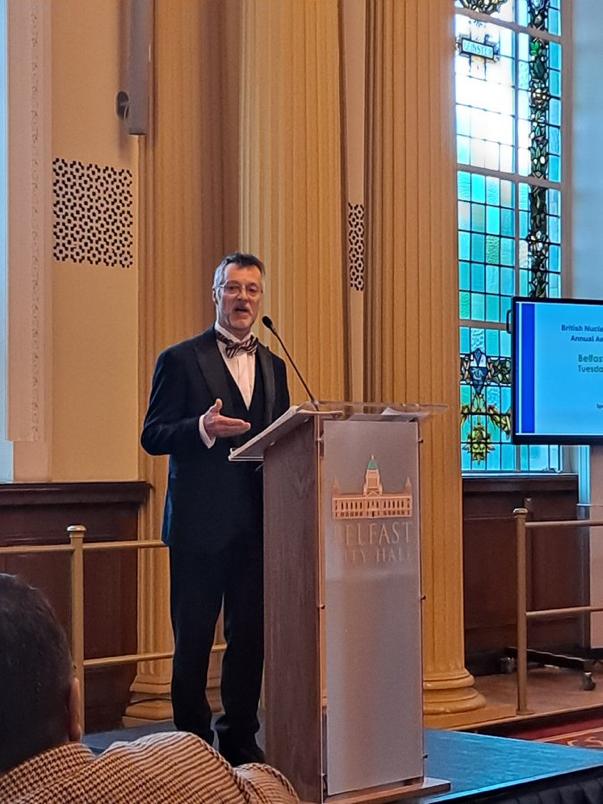
The British Nuclear Medicine Society has recognised a Diagnostic Radiographer and emeritus professor for his “outstanding contribution” to nuclear medicine.
The UK-based forum for all aspects of nuclear medicine dedicated the British Nuclear Medicine Society’s (BNMS) Radiographers, Technologists and Nurses Award to Professor Peter Hogg in recognition of the support he had given to the profession.
Professor Hogg said he was “deeply honoured” to be receiving the award, which he added was “completely unexpected and came out of the blue.” He was given the award during the BNMS Annual Spring Meeting 2024, which took place in Belfast from 13-15 May.
Overcoming negativity
Professor Hogg explained he was in an “unusual position” at his university, as he “inadvertently” found himself leading change when validating the first MA-level programmes in nuclear medicine (NM).
“I didn’t realise the amount of controversy I would find myself in,” he said. “People outside the profession were unhappy about radiographers and technologists being educated to Master’s level and this negativity continued for several years.”
Negativity from outside the profession “intensified” during Professor Hogg’s tenure as he introduced image reporting and cardiac stress courses for radiographers.
However, Professor Hogg responded by developing his leadership abilities to improve his understanding and therefore better influence change, as well as implementing strategies to improve his resilience to unhelpful and unkind comments.
“Based on this, the advice I would offer to others is - when faced with a worthy challenge, don’t walk away from it if the going gets tough,” he said. “Face it head-on, develop the skills needed to deal with it and build a reliable professional network around you to support you.”
'Determination, resilience, vision'
Professor Hogg started his career as a Diagnostic Radiographer at 21 years old, working exclusively in nuclear medicine. Within two years he gained qualifications in medical imaging, computer science, and teaching.
At the time, his nomination explained, radiography was not acknowledged as a “worthy academic or clinical career,” and few opportunities were afforded to radiographers.
“Peter had to work hard and fight for so many things,” the nomination added. “His personality, determination, resilience, vision, and leadership style catapulted him into the national limelight from an early age, and keeps him there still.
“His constant lobbying meant others started to listen to what he had to say, and over the years, change occurred slowly. It is worth noting that in the 80s and 90s, qualified staff moved on from radiography and nuclear medicine technology as professions because of their career-limiting problems.
“Peter stayed because he wanted to change the stars of people working in those professions.”
Prolific contributions
Professor Hogg became a superintendent radiographer by the time he was just 25 years old in 1987, and began writing the nuclear medicine section of the monthly journal, Radiography Today in the same year.
In 1990 Professor Hogg was invited to join the UK Government’s Administration of Radioactive Substances Advisory Committee (ARSAC) and remained on it for five years.
He took up his first lectureship at City, University of London in 1990, and successfully led the validation team for UK’s first MSc in NM for radiographers and technologists in 1992. He was then head-hunted by the University of Salford (UoS), where he led another successful MSc in NM validation team.
He was MSc NM course leader for 18 years. The MSc at UoS has now been running uninterrupted for over 30 years.
In the early 1990s, Professor Hogg became a member of the British Nuclear Medicine Society (BNMS) Technologist Committee.
In the mid-1990s, and over the next decade, he became MSc NM External Examiner at the University of the West of England, then University College Dublin and then Trinity College Dublin.
In 1995, at its inception, he became editorial board member of the journal Radiography and has served 29 continuous years so far on that board and is its longest-serving member.
Early in 2000, together with Ken Holmes, he led the creation of the first non-medical reporting course before going on to create a non-medical stress testing course.
In early 2002 he became professor of radiography. In 2008, Professor Hogg was nominated to join the European Association of Nuclear Medicine (EANM) Technologist Group. Also in 2008, he became an honorary NHS consultant radiographer in NM.
By the time of his retirement he was: visiting [full] professor (Netherlands, Hanze University), visiting researcher (Sweden, Karolinska Institute) and visiting adjunct professor (UCC, Ireland).
'World's most prolific radiography author'
Over the years, Professor Hogg has sat on many national and international medical imaging and radiography committees and been consultant advisor to several national professional and scientific bodies.
He has received many awards for his work, including best journal papers and best conference papers. On merit (not professional examinations), in 2008 he became a Fellow of the Society of Radiographers. In 2023 he was awarded SoR’s highest honour – a Gold Medal.
Such medals are awarded to a maximum of 10 people, every 10th year.
Through sole and co-authorship, Professor Hogg was UoS’ most prolific journal author for over five consecutive years. His nomination explained he is the "world’s most prolific radiography author and conference presenter."
At his retirement in August 2020, UoS Senate voted unanimously for him to become Professor Emeritus. UoS only awards this status on average every 18 months.
(Image: Peter Hogg)
